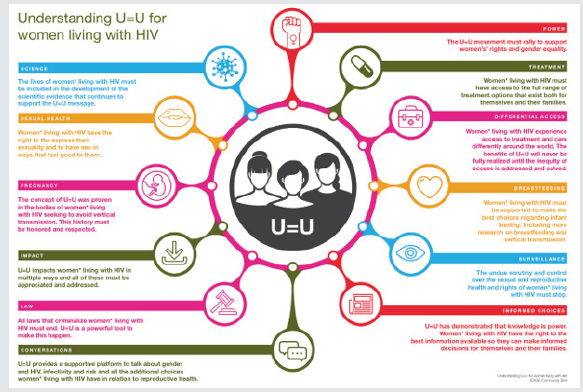Journal of Gynaecology | Lupine Publishers
Keywords
Short Communication
To explore some of the questions and concerns of women living with HIV regarding the broad application of U=U to their lives, ICASO commissioned a Community Brief on U=U for women living with HIV. Launched in September 2018 at the National AIDS Conference in Australia, this brief was written by a team of women living with HIV and was guided by a global community advisory committee, also made up by women living with HIV. Together they collected stories from over 65 women living with HIV from around the world and held two community consultations at the International AIDS Conference in Amsterdam in July 2018 to refine and test the content and construction of the brief. In particular, this global brief focused upon capturing the voices of women living with HIV and contains quotes of over 20 women from every region in the world. Their voices illuminate the intensely personal experiences of pregnancy, motherhood and infant feeding as well as some of the nuances around sexuality, access, equity and gender which exist in the lives of women living with HIV. The widespread adoption of the U=U discourse has provided an important opportunity to ensure that the sexual and reproductive rights of women living with HIV are recognized in the context of U=U and importantly, the profile of the U=U message has the potential to be a catalyst for the much-needed conversations about gender inequalities and violence, women’s*1 self-determination, access to treatment, women’s* involvement in research, body autonomy and informed choice as essential aspects in the lives of women* regardless of whether or not a woman* living with HIV is virally undetectable.
Perhaps the most contentious issue arising from the brief is the absence of quality research and evidence regarding the risk of HIV transmission via breastfeeding. There is an urgent need to recognize the social, emotional, practical and cultural challenges that women experience when it comes to the pressures, they are under to breastfeed or not with differing advice provided to women around the world often associated with access to clean water to provide infant formula in preference to breastfeeding. What the women expressed throughout the construction of the brief is a disconnect between medical evidence, breastfeeding guidelines, cultural practices and public health approaches to the risks and harms in relation to breastfeeding. What is most concerning is the fact that there is a fear on the part of women* living with HIV that they will not receive all the information on breastfeeding, nor will they receive appropriate social or medical support if they express their desire to breastfeed. This is both troubling and concerning. This prevents women* living with HIV from having the information they require to make their own informed decisions and choices that may affect the future health of their children and families.
This brief concludes with four actions that were ubiquitous across the communities of women* living with HIV that require urgent attention including;
I. The right of women* living with HIV to make informed choices about their sexual and reproductive rights, including the right to the birth control options of their choice as well as access to safe and legal abortion,
II. Better research into vertical transmission in the context of U=U,
III. Supporting and respecting women* living with HIV to make informed choices and the best decisions about infant feeding options for themselves and their children
IV. Increasing, improving and guaranteeing access to the range of HIV treatments that work best for women* living with HIV around the globe.
Optional Quote
For more Lupine Publishers Open Access Journals Please visit our website:
https://lupinepublishersgroup.com/
For more Journal of Gynaecology Please Click Here:
https://lupinepublishers.com/gynecology-women-health-journal/
To Know More About Open Access Publisher Please Click on Lupine Publishers


No comments:
Post a Comment
Note: only a member of this blog may post a comment.